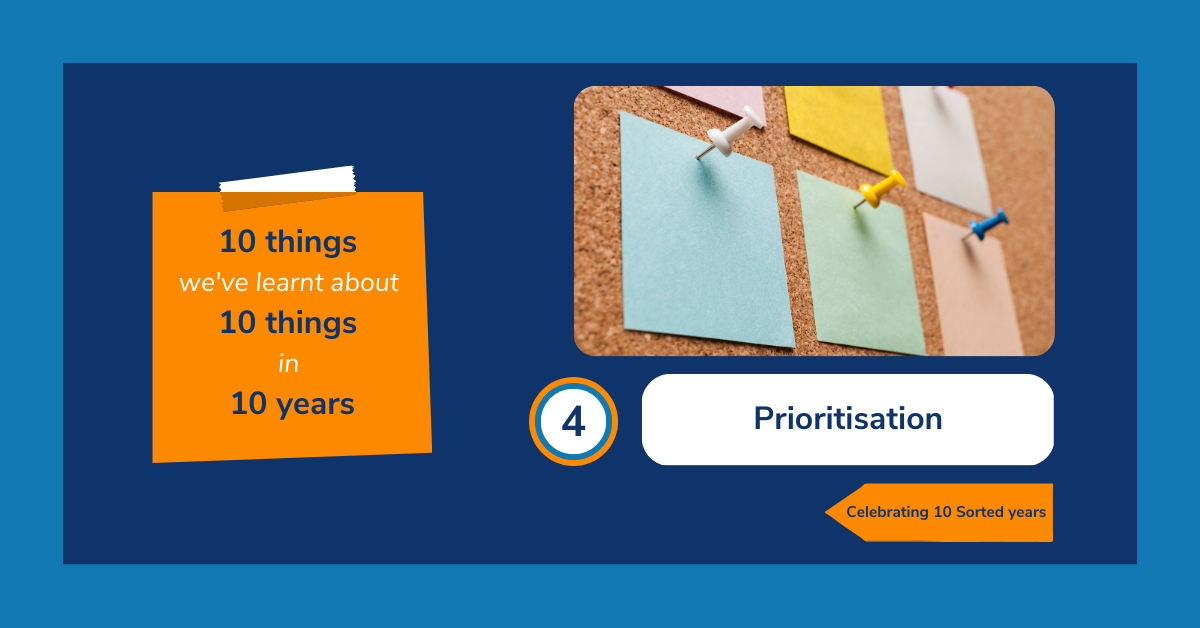As we celebrated our 10th birthday this year, we’ve been enjoying looking back on the past decade and celebrating everything we’ve learnt.
 As part of this, we gave ourselves a challenge to share 10 things we’ve learnt 10 things about in 10 years. Today, we are talking about one of our favourite subjects – planning and prioritisation!
As part of this, we gave ourselves a challenge to share 10 things we’ve learnt 10 things about in 10 years. Today, we are talking about one of our favourite subjects – planning and prioritisation!
We know that in a busy comms team, faced with an endless to-do list, competing priorities and tight deadlines, it can often be difficult to know where to start. At Sorted Communications, we’re committed to making our clients’ lives that little bit easier and are perfectly positioned to take the day-to-day comms off their hands, helping them find some headspace to focus on the bigger things. Here are our top tips to help you step back from the chaos, boost productivity and clear some of the everyday tasks from your plate.
1. Plan thinking time into your day
With more than 100 years’ experience between us, we’re used to managing a hectic schedule. Our first piece of advice is to be as strict as possible about how you manage your calendar. If you can, block out a few chunks of time each week when you won’t accept calls or meetings, to give yourself space to think and focus.
2. Make the most of flexible working
It can be tricky to focus when you’re constantly being asked questions or interrupted by colleagues. If your employer supports flexible working, you could try starting early, finishing late or working from home some days so you can use the quieter time to catch up when fewer people are around.
3. Batch your tasks
A favourite tactic of our director, Ali, is to batch tasks and theme your days (or half days). For example, you could try setting aside Friday afternoons to do all your admin-related tasks and perhaps a morning or two to work on a particular project. As much as we all want to be great at multi-tasking, task switching has been shown to have a negative effect on productivity.
4. Play to your strengths
Notice when you work best on different types of tasks (e.g. creative, process/admin or people-focused) and play to your strengths by doing those types of tasks at the time of day when you know you’ll be in the right headspace for them. You’ll often get through them much more quickly this way.
5. Make lists
We know this one sounds a bit obvious, but the power of a to-do list can’t be underestimated. Sometimes, the more information you have flying around in your head, the harder it can be to prioritise and work out what needs to be done when. By getting your thoughts down on paper (or screen), you may find you spend less time thinking about tasks and more time actually knuckling down and getting on with them.
6. Prioritise your tasks
Of course, a list will only get you so far. To be truly productive, you’ll need to also use the details you have about the various tasks on your list to categorise and prioritise your workload. For example, you might have lots of quick, relatively low priority tasks to complete and just a few high priority bigger pieces of work. While it would be easy to feel pressure to focus on just the high priority tasks, try to work a mixture of short and longer jobs into your day/week to make the best use of your time and make sure everything gets done.
7. Understand deadlines
This one is hugely important. Always make sure you’re really clear on deadlines so you can work to meet expectations and effectively assess how to order items on your to-do list. If you aren’t given a deadline, make sure to ask and ensure you know how urgent (or not) something is.
8. Be clear on expectations
Thinking back to flexible working, it can be helpful to check when somebody actually needs something from you. For example, if a deadline is 5pm on a Friday, that may just be because the recipient wants it to be ready when they start on Monday, but if you start work at 8am on Monday and they don’t start until 10am, knowing that could give you an extra two hours to work on it on Monday morning. If you know timelines are going to be tight, pushing for that extra detail can make all the difference.
9. Expect the unexpected
Wherever possible, we try to work to a day earlier than the actual deadline to allow for the inevitable ‘stuff’ that so often pops up and tries to derail your carefully laid plans!
10. Ask for help
It’s easy to get bogged down in work at times, but it’s really important that you don’t try to cope alone if you’re feeling overloaded. Use your team if you have one, speak to your manager to help you reallocate or prioritise some of your tasks if needed, or consider outsourcing some work. It’s a good idea to speak up early if you’re having issues – deadlines can often be adjusted but it’s always going to be better to do this sooner rather than later.
We hope these tips have given some food for thought. A few small changes can sometimes make a big difference.
If you’d like an extra pair of hands to help get everything done, get in touch today to find out how we can help get your communications sorted.
